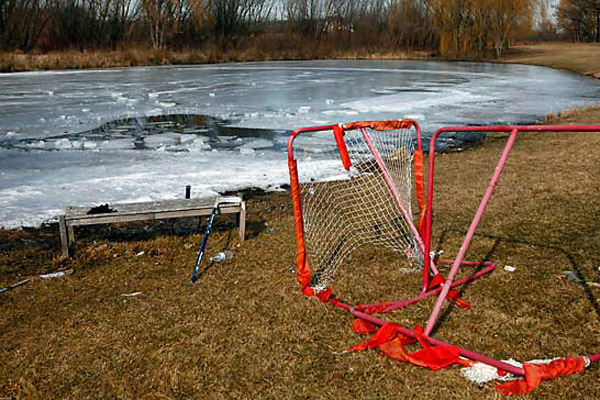
The images on the TV report made me shiver: the churned, caved in swath of shattered ice, the footage of a mourner sitting next to a frozen retention pond, the red pipes of a goal post still at the icy water’s edge, a family shocked and shattered. Patrick Rorig had been playing hockey on the pond with his son on Sunday, when he fell through the ice in McHenry Township and drowned.
I felt heartsick for the family, of course. Rorig, who his friends called “Rocco,” was just 47. As I watched, however, it dawned on me that this story was hitting me particularly hard. Then I realized why: Thirty-plus years ago, as a boy living in Laurel, Md., I was the one thrashing in the frigid water, wild-eyed with panic, gasping for breath, about to die.
Laurel Lake sits just across from the Laurel shopping mall and a quarter mile or so down the street from where I went to high school. Given Maryland’s relatively mild winters, the lake rarely froze. When it did, it was like a snowed-over hill after a winter storm. Kids, teen-agers, dads all converged, skidding and sliding across the glassy surface.
Inevitably, hockey sticks would appear. Someone’s shoes, placed a few feet apart, served as goals. That day, my best friend, Brian Tribble, and I teamed with a few other kids in a pick-up game. The day was so cold, and the ice seemed so thick, that falling through never occurred to us. But an errant shot sent the puck skidding toward one end of the lake, and me after it, full speed. As I approached the edge, however, I saw—like a film roll beginning to unspool, the ice suddenly growing thinner. In that way that such moments unfold in slow motion, I could see reeds and murk, dark under the slender pane of ice.
I tried to brake, but… crash! I was in the water, thrashing. Unless this has ever happened to you, you cannot understand the escalating sense of panic. I’d just get right back up, I thought. No. I could get my arms up on solid ice, but every time I did, another chunk broke off. Reach, crash. Reach, crash. The water had already saturated my parka, making my arms feel leaden. I don’t know whether the water was over my head or not, but I knew I could not touch bottom—and a pair of hockey skates made tredding difficult. I was quickly tiring.
Suddenly, I saw a line of guys lying down in single file, head to ankle, holding on to each other as they reached toward me. And there, at the head of the line, on his stomach and holding out a hockey stick, was Brian. I clutched at the end of the curved blade, then took hold. With a tug-of-war heave, they pulled me out.
I was shivering, of course, when they got me to shore. Almost comically, Brian and I simply walked across to the mall where I could call home from a payphone. My stepfather, George, rushed to pick me up and I spent the rest of the day under an electric blanket.
Today, there are no lasting effects from my brush with death. Ironically, my favorite form of exercise is… ice skating. But once in a while the moment comes back on me—when I watch the scene in It’s a Wonderful Life when George saves kid brother, Harry. And when I see stories like that of Rocco Rorig, and other recent accidents involving breaking through the ice, including the report just five days ago of a man named Robert George who plunged into the ice to save a 9-year-old boy who had broken through.
What really weighs on me is not the accident itself. It’s that I never really thanked my friend sufficiently. Honestly, I don’t ever remember thanking him at all. My God, he saved my life. Years later, when we got to high school, Brian and I drifted apart and lost touch. I haven’t spoken to him since. I think about him, though, whenever I think of that day. In his case, there were no TV cameras around, no newspaper reporters. But he was every bit a hero—and will forever be in my mind. In writing this I realize that I need to find him and thank him. It’s my commitment. Meanwhile, God Bless you, Rorig family—and thank you, Brian, wherever you are. I owe you my life.
Photograph: Chicago Tribune


